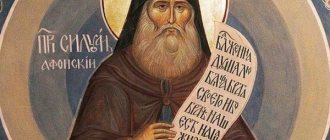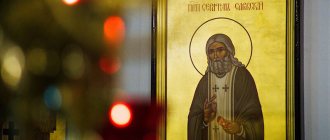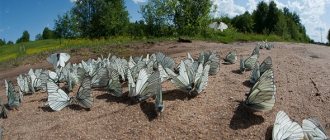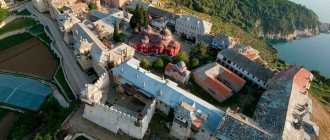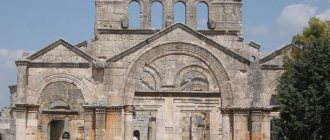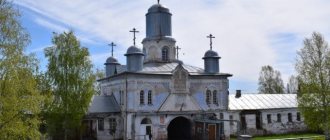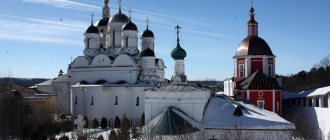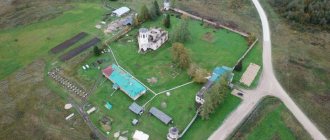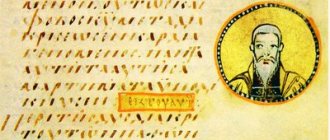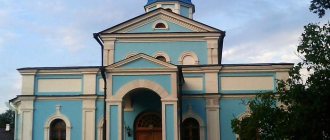Before conscription age, the elder was a peasant. After serving, Elder Silouan decided to become a monk.
The following record about the elder has been preserved on Mount Athos:
Schemamonk Father Silouan, worldly name - Semyon Ivanovich Antonov, peasant of the Tambov province, Lebedinsky district, Shovsky volost and village. Born in 1866, came to Mount Athos in 1892, was tonsured in 1896; to the schema - in 1911. Obediences took place: at the Mill, at the Kalamarei metoch (the property of the Monastery outside Athos), in Old Nagorno-Rusik, in Economy. Died 11/24 September 1938.
Childhood
When little Semyon was 4 years old, his father gave shelter to a wanderer at home; it was on the eve of a holiday, and this man sold books and turned out to be an educated and interesting conversationalist. Unexpectedly for himself, Semyon heard something completely unusual: that Christ is not Lord at all, and that there is no God.
As an argument, the wanderer asked: “Where is He, your God?”; and then the little boy thought: “When I grow up, I will go all over the world to seek the Lord.” When the wanderer left the house, little Semyon said to his father: “You teach me to pray, but the wanderer said that there is no God.” The father replied: “I thought he was a smart man, but he turned out to be a fool. Do not listen to him". The father's answer did not remove doubts from the boy's soul.
After Semyon felt faith in himself, his mind turned to the Lord, and he prayed tirelessly with tears. Then the elder realized that a desire for monastic life was growing within him. Semyon began to beg his father to let him go to the Kiev-Pechersk Lavra, but he was adamant: “First finish your military service, and then you will be free to go.”
Semyon grew up to be a handsome, brave and strong young man. One Easter, after a festive meat meal, when his brothers had gone away, he stayed at home, his mother boiled him almost 50 eggs, and he ate them all. In those years, Semyon worked on the estate of Prince Trubetskoy, and on holidays he went to an establishment where he could drink about 3 liters of vodka, but he was never drunk.
One day, in severe frost, the horse’s hooves froze to the ice and the horse did not allow it to be knocked down. Semyon held the horse's head with his hands and it did not resist. With his bare hands, the young man could take a hot pot of cabbage soup and move it from the stove to the table. With a blow of his fist, Semyon could break a thick board.
“I have not come to the measure of my father”
In the world his name was Semyon Ivanovich Antonov. He was born in 1866 to an ordinary peasant family, received almost no education (he only managed to attend school for two winters) and in the future was supposed to marry and become a village owner, like his father.
Semyon had all the makings for this: from childhood he helped his father in the field and had great physical strength. With a blow of his fist he could break a thick board, but he held the horse, whose hooves were frozen into the ice, while the owner freed the animal from “captivity.”
Semyon really became like his father, but only in a different way. According to recollections, Ivan Antonov was distinguished by a sensitive heart, treated others with great love and had life wisdom: he never scolded his son, but tried to delicately point out his mistakes.
One day Semyon inadvertently prepared pork for lunch on a fast day - Friday - and took it to his father in the field. The father ate lunch and only six months later explained to Semyon that he had made a mistake. “Why didn’t you tell me then?” asked Semyon. “Son, I didn’t want to embarrass you.”
Semyon often recalled similar episodes associated with his father: “I did not come to the extent of my father. He was completely illiterate, and even read the “Our Father” with an error, saying “day” instead of “today” (he learned it by ear in church), but he was a meek and wise man.”
Army and military service
Semyon served in St. Petersburg, in the Life Guards, in the Sapper Battalion. Even during the service, the young man always thought about God. In the army he was loved and known as a dutiful, meek comrade.
He told his colleagues:
“I think: we are now sitting in a tavern, eating, drinking vodka, listening to music and having fun, and on Mount Athos they are now holding a vigil and will pray all night, so - which of us will give the best answer at the Last Judgment, them or us? »
Semyon was with his thoughts and deeds on Athos, sending regular donations there.
Having completed his military service, the elder went to Father John of Kronstadt to ask for his blessing. Father John was not in Kronstadt, and Semyon left him a letter:
“Father, I want to become a monk; pray that the world will not detain me.”
Returning to St. Petersburg the next day, the elder felt for the first time that “hell’s flames were raging around him.” Semyon went home, but stayed there only a week and hastily got ready for Athos.
Monastic works
Simeon was tonsured into the mantle in 1896. He carried out various obediences - he was a monastery housekeeper, he was in charge of workshops and a food warehouse, and in his declining years - a trading shop. But the external side of life in no way conveys what the monk was experiencing in his heart.
After the weakening of the effect of grace, Silouan of Athos began to experience demonic attacks again, saw demons in reality, and was very embarrassed by this. He decided to consult with Elder Anatoly. The elder instructed the new monk in prayer, and then, unable to resist, was surprised at his talent and spiritual experience. And the Monk Silouan began a new struggle - with thoughts of pride and vanity. Anyone who is at least partially familiar with the struggle against thoughts can imagine how fierce the struggle was waged by the ascetic. Despite his inexperience, monk Silouan had a courageous soul that faced demonic attacks without fear.
Thus, strengthened by visits of grace, Silouan of Athos comprehended heartfelt prayer through a storm of temptation.
After being tonsured into the schema in 1911, Silouan of Athos wrote Notes, which were published in 1952 by Archimandrite Sophrony Sakharov. This book is known among monastics as the “New Philokalia.”
Holy Mount Athos
Semyon arrived on the Holy Mountain in the fall of 1892 and entered the monastery of St. Panteleimon. Thus began his ascetic life in the monastery. According to Svyatogorsk traditions, the new novice Simeon had to spend several days in complete peace in order to remember his sins in his past worldly life, and then write them down and confess to his confessor. Hot repentance arose in the elder. In confession, Simeon wanted to free himself from a heavy burden; therefore he openly confessed all the deeds of his life.
The confessor said to the novice Simeon:
“You have confessed your sins before God, and know that they have all been forgiven you... From now on we will make a beginning of a new life... Go in peace and rejoice that the Lord brought you to this haven of salvation.”
Brother Simeon began his path to Svyatogorsk monastic life: he prayed alone in his cell; defended church services; fasted; took communion; read; performed obedience. On Mount Athos, the novice Simeon began to say the Jesus Prayer using the rosary. Simeon rejoiced that this prayer could be performed always and everywhere.
About three weeks passed, and when one evening Simeon prayed before the icon of the Mother of God, prayer entered his heart and began to happen day and night.
The elder’s first “obedience” was to work at the mill. This was the era of the rise of Russian monasticism on the Holy Mountain. The monastery grew and began to resemble a real living city. The number of monks grew to almost two thousand, and pilgrims arrived by the hundreds from the Russian Empire. There was a lot of work at the mill. Simeon slept little, fasted, prayed a lot, cried and carried heavy bales of flour.
Teachings and moral teachings of the saint
The merciful Lord gave Father Silouan the gift of miracles, insight and wise words. The advice and instructions of the saint are known to the entire Orthodox world. They can be found in the following creations:
- “The Writings of Elder Silouan”;
- "Salvation according to the teachings of St. Silouan of Athos."
The monk taught that the absence of humility prevents one from acquiring grace, and the soul, not feeling the presence of the Lord, grieves. Father Silouan did not condemn anyone and did not laugh at anyone. He taught to cry both for one’s own and for the sins of others.
The merciful Lord gave Father Silouan the gift of miracles
Attacks of demons and the appearance of Christ
Months passed, and attacks by evil spirits on the elder began to become more frequent. Simeon's fortitude was shaken. He lost faith in the presence of God and thought that the Lord had abandoned his child. That same evening, during a service in the Church of the Holy Prophet Elijah at the mill, the elder saw Christ in the flesh. The Lord stood to the right of the royal doors, at the icon of the Savior. Christ appeared to the young novice, and Simeon again felt the grace of the Holy Spirit.
The appearance of the Lord to the novice Simeon became a key event in his life. Without a doubt, this influenced his entire future fate.
Some time later, on a holiday, after a service in the temple, which lasted all night, in the morning Brother Simeon was serving in the refectory, when grace overshadowed him again. These events influenced the elder so much that he began to constantly look for this feeling, remembered it and missed it.
The elder began to look for answers from his confessor and in the texts of ascetics. This is how the monk learned that the appearances of Christ are manifestations of a rare gift. It remains to find the answer why the demons did not leave the old man’s mind, torturing him again and again.
Simeon went to Stary Rusik for advice from the elder Father Anatoly. The elder suggested that Simeon was praying incorrectly and that is why he sees demons so often. He replied that he did not understand what it meant to pray correctly or incorrectly.
“During prayer, keep your mind pure from all imagination and thoughts and enclose it in the words of prayer,” said Elder Anatoly.
Fifteen years have passed since the Lord appeared to Saint Silouan. One night, while fighting demons, Silouan, while praying, saw a gigantic figure of a demon standing in front of the icons.
“Lord, You see that I want to pray to You with a pure mind, but the demons do not let me. Teach me what I should do so that they don’t bother me?” - the old man said in despair.
“The proud always suffer so much from demons” - this answer came to the elder from the very heart of his soul. “Lord, teach me what I must do so that my soul may be humble.” “Keep your mind in hell, and do not despair.” This short conversation with God became a new milestone in the life of Father Silouan.
The first appearance of the Lord to the saint was filled with light; it brought love and joy, but the light that came into the old man’s soul began to fade. Why did this light and its goodness not have the character of inalienability?
Monk Silouan, after a conversation with God, began to pray fervently. Through pure mental prayer, a monk learns the secrets of his soul. Saint Silouan always behaved very simply. He was poorly taught to read and write; as a child he went to a rural school, but since he read many spiritual books on Mount Athos, he developed greatly and gave the impression of an unusually educated and knowledgeable person.
“By nature he had a lively, quick-witted mind, and his long experience of spiritual struggle, internal mental prayer, the experience of exceptional suffering and exceptional Divine visits made him inhumanly wise and insightful” - book: St. Silouan of Athos.
The soul cannot fail to recognize God
Semyon was an unusual novice and monk. Usually those who came to Athos lived for some time in different monasteries and monasteries and then chose one of them. Semyon immediately came to the Russian monastery of St. Panteleimon (Russik, as he was called on Athos), and stayed there forever.
They say that you need to go to Athos for at least a week, because in the first days a person has to readjust from one rhythm of life to another. Semyon was going to stay on the Mountain for the rest of his life. According to custom, first there was a long conversation with the confessor, during which he confessed the sins that he had committed “before Athos” life.
I knew one boy. His appearance was angelic; humble, conscientious, meek; white face with blush; The eyes are light, blue, and kind and calm. But when he grew up, he began to live uncleanly and lost the grace of God; and when he was about thirty years old, he began to look like a man and a demon, and a beast and a robber, and his whole appearance was stingy and terrible. I also knew one girl of very great beauty, with a bright and pleasant face, so that many envied her beauty. But through her sins she lost grace, and it became bad to look at her. But I also saw something else. I saw people who came to become monks with faces distorted from sins and passions, but through repentance and pious life they changed and became very handsome.
Soon after the beginning of his novitiate on Mount Athos, he began to be tormented by the thought: “You pray, and perhaps you will be saved, but if in paradise you do not find either father, mother, or those you love, then there will be no joy for you there either.” " Due to his youth and inexperience, he did not understand what was actually happening to him. After some time, demons began to appear to him regularly, and the torment of their attacks increased. The spiritual strength of the young novice began to decline.
After a few months, the monk reached the last despair and thought that it was impossible to beg God. With this thought, he felt completely abandoned and remained in this state for about an hour. On the same day, during Vespers, in the Church of the Holy Prophet Elijah, to the right of the royal gates, where the local icon of the Savior is located, he saw the living Christ. This is how the saint’s student, Archimandrite Sophrony (Sakharov), describes this episode:
“The Lord appeared incomprehensibly to the young novice,” and his entire being, and his very body, was filled with the fire of the grace of the Holy Spirit, that fire that the Lord brought down to earth with His coming (Luke 12:49). Simeon became exhausted from the vision, and the Lord disappeared.
It is impossible to describe the state in which he was at that hour. A great Divine light shone upon him, he was taken out of the world, as it were, and raised in spirit to heaven, where he heard ineffable verbs; at that moment he received, as it were, a new birth from above (John 1:13, 3:3). The gentle gaze of the all-forgiving, immeasurably loving, joyful Christ attracted the whole person to himself and then, hiding, the sweetness of God’s love enraptured his spirit into the contemplation of the Divine, already outside the images of the world. Subsequently, in his writings, he endlessly repeats that he knew the Lord through the Holy Spirit, that he saw God in the Holy Spirit. He also asserted that when the Lord Himself appears to the soul, it cannot help but recognize in Him its Creator and God.”
He was allowed to stay on Athos and was given a new name - Silouan. At a very young age, the saint received the gift of unceasing prayer, and he prayed fervently throughout his life. He learned to hardly sleep at night, dozing off in fits and starts for 15-20 minutes, and reading prayers for the rest of the hours.
Panteleimon Monastery on Mount Athos
Quotes from Silouan of Athos
- “God always surrounds us with those people with whom we need to heal from our shortcomings.”
- “Friendship with someone who has a pure heart is valuable, but meeting him is more difficult than finding water in the desert.”
- “An overfilled vessel overflows. So a person’s overflowing heart pours out onto his neighbors what it is full of.”
- “If they bring dirt into your house, don’t ask where it comes from, throw it away immediately; If thoughts of condemnation enter your mind, do not inquire whether they are right or wrong - they are only dirt.”
- “To be saved, you must humble yourself. Because even if a proud person is forced into heaven, he will not find peace there either and will be dissatisfied and say: “Why am I not in first place?” But a humble soul is filled with love and does not seek primacy, but desires the good of everyone and is content with everything.”
- “Don't teach children to be rich, but teach them to be happy. Then, when they grow up, they will know the value of things, not their price.”
Death of an ascetic
Silouan of Athos died on September 24, 1938, having been ill for a week before that. On Athos they are in no hurry to glorify anyone to death, treating every person with sober distrust. The saint’s skull lay in the tomb, like the others, and did not attract attention. After Archimandrite Sophrony published a book about the elder, it was translated into French and English, and many people learned about the Athonite ascetic. They arrived on Athos and asked where to see the head of Elder Silouan. Abbot Justin ordered the head of the elder to be drowned, but the monks did not carry out this order and hid it for a long time. After a while, one of those who hid the honest head became the abbot, and thus the shrine was preserved.
God has many ascetics and saints, everyone can find a friend after their heart in the ranks of the saints.
If someone has felt a special attraction to Elder Silouan, then they can read the book of Archimandrite Sophrony Sakharov, “Elder Silouan of Athos”. In the name of Jesus he sanctifies the whole person, burning passions within him.” Silouan of Athos
Bibliography
- About knowing the will of God
- About obedience
- About Sacred Tradition and Scripture
- About the Name of God
- Thoughts of an old man: about plants and animals
- About the beauty of the world
- About temple worship
- About making a person like Christ
- About the search for God
- About attitude towards one's neighbor
- On the unity of the spiritual world and the greatness of the saints
- About the spiritual vision of the world
- About two ways of understanding the world
- About the signs of grace and charm
- Thoughts on freedom
- On a person's personal relationship to the Personal God
- About love for enemies
- Distinguishing between good and evil
- The Way of the Church
